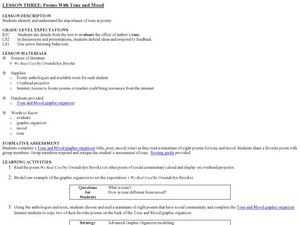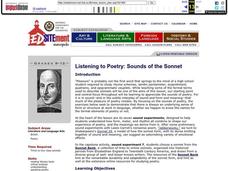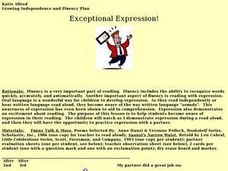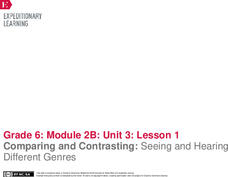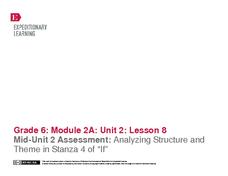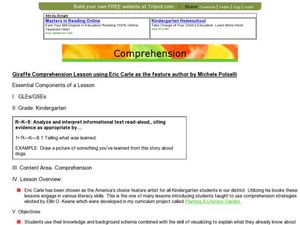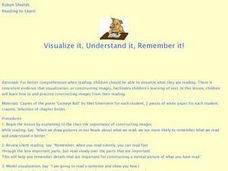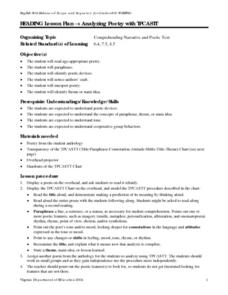Curated OER
Number Writing Poems
Pupils read the short poem for each number to help them with number formation. In this numbers lesson plan, students follow directions of the poems.
Curated OER
Discovering Angel Island: The Story Behind the Poems
Students watch a video titled Discovering Angel Island: The Story Behind the Poems about immigrants that came through Angel Island. In this Angel Island lesson plan, students respond with a journal entry.
Curated OER
Poems with Tone and Mood
Students examine the use of tone in poetry. In this literature lesson, students read "We Real Cool," by Gwendolyn Brooks and use the provided graphic organizer to chart the poem's tone and mood.
Curated OER
Reading About the Journey: The Odyssey
Students practice their reading skills. In this reading fluency and comprehension instructional activity, students read instructor-selected passages from The Odyssey following the provided steps for the reading class activity that...
Curated OER
Shh! It's Reading Time!
Students observe and demonstrate how to read silently. They discuss the "Cross-Checking" strategy, select a book for independent reading, and demonstrate silent reading. Students write a summary of what they have read in their reading...
Curated OER
A Journey To Japan Through Poetry
Third graders gain an appreciation for writing, analyzing, reading and listening to poetry, viewing poems as a motivation for studying Japanese culture and tradition. They study and create their own haiku and tanka poems with illustrations.
Curated OER
Listening to Poetry: Sounds of the Sonnet
Students experience and enjoy the sounds of poetry. They erform sound experiments with sonnets and closely read and analyze a sonnet by Shakespeare. Students write an analysis of how sound affects meaning in a sonnet chosen from the...
Curated OER
"Leap, plashless": Emily Dickinson & Poetic Imagination
Learners examine different poems from Emily Dickinson. They practice listening for meter in the poems and make connections between the texts. They also practice their own creative writing skills.
Curated OER
Exceptional Expression!
Young elementary learners develop expression while reading. They listen as the teacher demonstrates expression when reading aloud. Individual learners read with a partner and practice using expression in their reading. When their partner...
Curated OER
Producing Beats
Turn your classroom into a music studio as groups work together to determine why music sounds different when performed live versus a recording. After listening to some different music, each group picks a poem, creates a recording, and...
Classroom Adventures Program
Creating Characters
Examine character in depth. Over the course of these six lessons, learners explore their own character traits, determine the traits of characters in the books they read, practice comparing and contrasting, and collaborate in small...
Rainforest Alliance
Knowing the Essential Elements of a Habitat
To gain insight into the many different types of habitats, individuals must first get to know their own. Here, scholars explore their school environment, draw a map, compare and contrast their surroundings to larger ones. They then...
EngageNY
Comparing and Contrasting: Seeing and Hearing Different Genres
Let's compare and contrast! Scholars use a Venn diagram to compare and contrast the experience of reading a poem and listening to its audio version. Next, they complete graphic organizers, comparing two different genres: a poem and a...
EngageNY
Grade 11 ELA Module 2: Unit 2, Lesson 11
In Audre Lorde's poem "From the House of Yemanjá," the speaker describes her mother's two faces, adding a whole new meaning to the phrase "two-faced." Pupils first read the final stanza of the contemporary poem. With a Quick Write, they...
EngageNY
Analyzing Structure and Theme in Stanza 4 of “If”
Here is a lesson plan that provides scholars with two opportunities to stretch their compare-and-contrast muscles. First, learners compare and contrast their experience reading the fourth stanza of If by Rudyard Kipling to listening to...
Facing History and Ourselves
Responding to Difference in Democracy
Disagreements happen in a diverse democracy. It's what people do about these differences in a diverse society that the resource models. After listening to an eight-minute podcast about a woman who collaborated with people who have very...
Read Works
What's the Main Idea?
By sharing a summary about their favorite book or movie, your young readers can then discuss the main ideas of their beloved stories. The concept transitions to finding the main idea in poetry. Class members use textual clues in various...
Curated OER
Giraffe Comprehension using Eric Carle as the Feature Author
Students demonstrate reading comprehension by drawing a picture and writing a sentence about giraffes. In this early reading comprehension lesson, students listen to a read aloud and watch a video about giraffes before drawing a giraffe...
Curated OER
Picture It!
Young scholars participate in visualization exercises as a reading comprehension strategy. As the teacher reads a poem, the students visualize the setting, then read the poem "Daddy's Making Dinner" and create a drawing of what they...
Curated OER
Visualize It, Understand It, Remember It!
Students observe and demonstrate visualization exercises to improve their reading comprehension. They discuss how to visualize images, then draw pictures for sentences written on the board. Students read the poem Gumeye Ball by Shel...
Curated OER
Analyzing Poetry with TPCASTT
Middle schoolers read a poem and complete a TPCASTT chart. They make a prediction about the title (T) , paraphrase each line (P), identify poetic devices and nuances (C-connotation), explore mood and tone (A-attitude), point out shifts...
Curated OER
Breaking up a Poem
Seventh graders break down the barriers in reading, speaking, listening, writing and understanding poetry. As a whole group, they establish their own criteria for line breaks by discussing questions and taking notes on a PowerPoint...
Curated OER
Paradise Lost: Anticipation Guide
To set the stage for reading Paradise Lost, class members compete an anticipation guide containing statements that connect to themes in Milton's epic poem.
Novelinks
The Good Earth: Biopoem Strategy
To gain a better understanding of characters in Pearl Buck's The Good Earth, kids create a biopoem for one of her characters.


